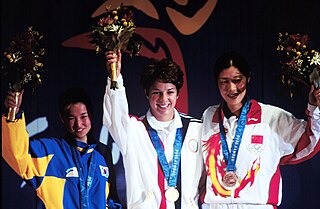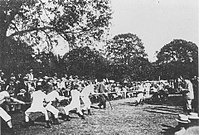
The 2000 Summer Olympics, officially known as the Games of the XXVII Olympiad, were a summer multi-sport event held in Sydney, New South Wales, Australia, from 15 September to 1 October 2000. A total of 10,651 athletes from 199 nations represented by National Olympic Committees (NOCs), including the Olympic debuts of Eritrea, Micronesia and Palau. The games featured 300 events in 28 sports across 39 disciplines, including the debuts of synchronized diving, taekowndo, triathlon, trampolining, women's modern pentathlon and women's weightlifting as official Olympic medal events.
The 1992 Summer Olympics, officially known as the Games of the XXV Olympiad, and officially branded as Barcelona '92, were an international multi-sport event held in Barcelona, Spain, from 25 July to 9 August 1992. A total of 9,356 athletes representing 169 National Olympic Committees (NOCs) participated. The games featured 257 events in 25 sports and 34 disciplines. Badminton, baseball, and women's judo were included as official medal events for the first time.

The 1988 Summer Olympics, officially known as the Games of the XXIV Olympiad, were an international multi-sport event held in Seoul, South Korea, from 17 September to 2 October 1988. A total of 8,397 athletes representing 159 National Olympic Committees (NOCs) participated in 237 events in 23 sports across 31 different disciplines. Table tennis was introduced to the Summer Olympic Games program at these games, while tennis was reintroduced following its removal after the 1924 Summer Olympics in Paris, France.

The 1980 Summer Olympics, officially known as the Games of the XXII Olympiad, were an international multi-sport event held in Moscow, Soviet Union, from 19 July to 3 August. They were the first Olympic Games to be staged in a communist nation. A total of 5,179 athletes representing 80 National Olympic Committees (NOCs) participated. This was the fewest number of participating NOCs since 1956, which included seven teams making their Olympic debut at the Summer Games; Angola, Botswana, Cyprus,, Jordan, Laos, Mozambique, and Seychelles. The games featured 203 events in 21 sports across 27 disciplines.

The 1972 Summer Olympics, officially known as the Games of the XX Olympiad, were a summer multi-sport event held in Munich, West Germany, from 26 August through 11 September 1972. 7,134 athletes representing 121 National Olympic Committees (NOCs) participated. The games featured 195 events in 21 sports across 28 disciplines.

The 1956 Summer Olympics, officially known as the Games of the XVI Olympiad, and officially branded as Melbourne 1956, were an international multi-sport event held from 22 November to 8 December in Melbourne, Australia, with the equestrian events being held from 10 to 17 June 1956 in Stockholm, Sweden, due to Australian quarantine regulations that required a six-month pre-shipment quarantine on horses. Medals awarded in these cities bore different designs. A total of 3,314 athletes representing 72 National Olympic Committees (NOCs) participated, which was a record for the most NOCs at a single Olympics at the time. This figure included first-time entrants Cambodia, Ethiopia, Fiji, Kenya, Liberia, Malaya, North Borneo, and Uganda. The games featured 151 events in 17 sports across 23 disciplines.
The 1952 Summer Olympics, officially known as the Games of the XV Olympiad and commonly known as Helsinki 1952, were an international multi-sport event held from 19 July to 3 August 1952 in Helsinki, Finland. A total of 4,955 athletes representing 69 National Olympic Committees (NOCs) participated, which included 12 teams making their Olympic debut at the Summer Games: The Bahamas, Guatemala, Hong Kong, Indonesia, Israel, Netherlands Antilles, Nigeria, People's Republic of China, Saar, the Soviet Union, Thailand, and Vietnam. The games featured 149 events across 17 sports in 23 disciplines, including the Olympic debut of women's gymnastics events and the transition of equestrian sports becoming mixed.

The 1936 Summer Olympics, officially known as the Games of the XI Olympiad, was an international multi-sport event held in Berlin, Germany, from 1 August to 16 August.
The 1932 Summer Olympics, officially known as the Games of the X Olympiad, was an international multi-sport event held in Los Angeles, California, United States, from July 30 to August 14.

The 1924 Summer Olympics, officially known as the Games of the VIII Olympiad, was an international multi-sport event held in Paris, France, from 4 May to 27 July. A total of 3,089 athletes from 44 nations participated in 126 events in 17 sports across 23 different disciplines.

The 1920 Summer Olympics, now officially known as the Games of the VII Olympiad, were an international multi-sport event held in Antwerp, Belgium, from August 14 to September 12, 1900. A total of 2,622 athletes representing 29 National Olympic Committees (NOCs) participated. The games featured 162 events in 29 disciplines. Willis Lee won five gold medals and 7 total medals at the 1920 Summer Olympics, the most of any competing athlete.

The 1904 Summer Olympics were held in St. Louis, Missouri, United States from July 1 to November 23, 1904, as part of the St. Louis World's Fair.

The 1994 Winter Olympics, officially known as the XVII Winter Olympics, were a winter multi-sport event held in Lillehammer, Norway, from 12 to 27 February 1994. 1,737 athletes representing 67 National Olympic Committees (NOCs) participated. The games featured 61 events in 6 sports and 12 disciplines. Due to scheduling changes made in 1986 with the intent to begin holding the Summer Olympics and Winter Olympics in different years for the first time and moving forward, this edition of the Winter Olympics took place only two years after the previous event.
The 1928 Winter Olympics medal table is a list of National Olympic Committee's nations ranked by the number of medals won during the 1928 Winter Olympics, held in St. Moritz, Switzerland from February 11 to February 19, 1928. A total of 464 athletes from 25 countries participated in these Games, competing in 14 events in 6 disciplines.

The 1964 Winter Olympics, officially known as the IX Olympic Winter Games, were a winter multi-sport event held in Innsbruck, Austria, from 29 January to 9 February. A total of 1,091 athletes representing 36 National Olympic Committees (NOCs) participated, including India, Mongolia, and North Korea, who took part in the Winter Games for the first time. The games featured 34 events in 6 sports across 10 disciplines, including the Olympic debut of Luge.

The 1960 Winter Olympics, officially known as the VIII Olympic Winter Games and also known as Squaw Valley 1960, were a winter multi-sport event held from February 18 to 28, 1960, at the Squaw Valley Resort in Squaw Valley, California, United States. A total of 665 athletes representing 30 National Olympic Committees (NOCs) participated, including South Africa who took part in the Winter Games for the first time. It was the first time all five continents represented in the Olympic rings were represented in the Winter Games.

India competed at the 1900 Summer Olympics in Paris, France. It was the nation's first appearance at the modern Olympic Games. This marked the first participation of an Asian country in the Olympic Games.

The all-time medal table for all Olympic Games from 1896 to 2024, including Summer Olympic Games, Winter Olympic Games, and a combined total of both, is tabulated below. These Olympic medal counts do not include the 1906 Intercalated Games which are no longer recognized by the International Olympic Committee (IOC) as official Games. The IOC itself does not publish all-time tables, and publishes unofficial tables only per single Games. This table was thus compiled by adding up single entries from the IOC database.

The 2008 Summer Olympics, officially known as the Games of the XXIX Olympiad, were a summer multi-sport event held in Beijing, the capital of the People's Republic of China, from 8 to 24 August 2008. Approximately 10,942 athletes from 204 National Olympic Committees (NOCs) participated in 302 events in 28 sports across 41 disciplines. Cycling BMX racing and 10 km (6.2 mi) marathon swimming were included as official medal events for the first time in history. The Marshall Islands, Montenegro and Tuvalu made their Summer Olympic debuts in Beijing.

The 2010 Winter Olympics, officially known as the XXI Olympic Winter Games, was a winter multi-sport event held in Vancouver, British Columbia, Canada, from February 12 to February 28. A total of 2,632 athletes representing 82 National Olympic Committees (NOCs) participated in 86 events from 15 different sports and disciplines.


















